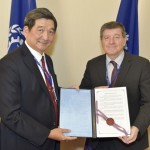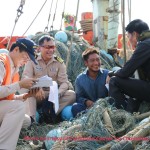
One year after the boat people crisis on the Indian Ocean, the number of Rohingya Muslims and other people fleeing Myanmar and Bangladesh by sea fell by 96 percent, in large part because of Thailand’s crackdown on human trafficking syndicates, a United Nations official said last week.
“There does not appear to be significant movements anywhere near the scale of last year,” said a Bangkok-based official with the International Organization for Migration, a United Nations agency.
The 96 percent drop covers the second half of 2015, and is in comparison to the same period during the previous year. The U.N. official said the trend was continuing through the first three months of this year. Very few boats had been spotted so far in 2016, he said.
Only 1,600 Rohingya or Bangladeshis took to the seas in the second half of 2015, according to statistics recently released by the United Nations High Commissioner on Refugees. By comparison, during the first half of that year, before the Thai crackdown began, 31,000 people left Myanmar and Bangladesh by boat hoping to reach Malaysia or Indonesia.
In May 2015, Thai police uncovered mass graves and virtual prison camps near the border with Malaysia where traffickers had held untold numbers of migrants for ransom before sending them across the border to Malaysia and into the hands of more traffickers. Even more mass graves were found on the other side of the border.
Police issued arrest warrants for over 150 people they allege were part of a transnational human trafficking syndicate, and 92 of those suspects are now on trial at the special Human Trafficking Division of the Criminal Court in Bangkok. Among those facing justice are high-ranking officers in the military and police, and local politicians along with career criminals, including some foreign nationals.
When the arrests began, traffickers, fearing capture, abandoned approximately 7,000 victims on the Indian Ocean. Thai Prime Minister Prayut Chan-o-cha organized two special regional meetings in Bangkok in attempt to forge cooperation in solving the crisis.
Although agreements were reached to provide assistance and resettlement for those stranded at sea, the meetings failed to find solutions to the root causes of the crisis in Myanmar and Bangladesh. U.N. officials have warned that unless root causes are addressed, the crisis is likely to re-erupt.
“The decline is the result of a combination of factors,” said the IOM official. The factors include the Thai crackdown, and a greater reluctance by people to risk the journey after learning what happened to others who fell into the hands of traffickers from news reports and others in their communities, and greater awareness raising campaigns by government and civil society.
Furthermore, the recent election of a democratic government in Myanmar has some taking a wait-and-see attitude, hoping that conditions there may improve.
Also last week, a high-ranking official with the U.N. refugee agency urged the new government of Myanmar to resume talks with Thailand over repatriating those among the 100,000 refugees in the Kingdom who would like to return to Myanmar voluntarily.
Thailand has been providing refuge for those who have fled fighting and persecution in Myanmar since the 1980s, demonstrating the Kingdom’s commitment to humanitarian principles and policies.
For more information and updates about Thailand’s policies and actions against trafficking in persons and related issues, visit www.thaianti-humantraffickingaction.org




